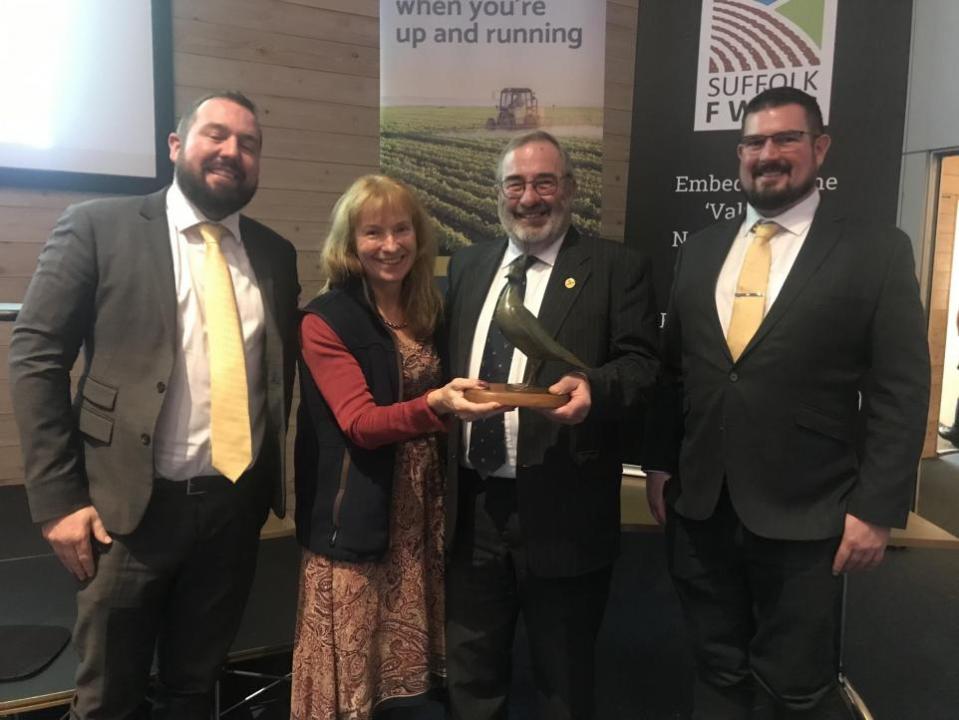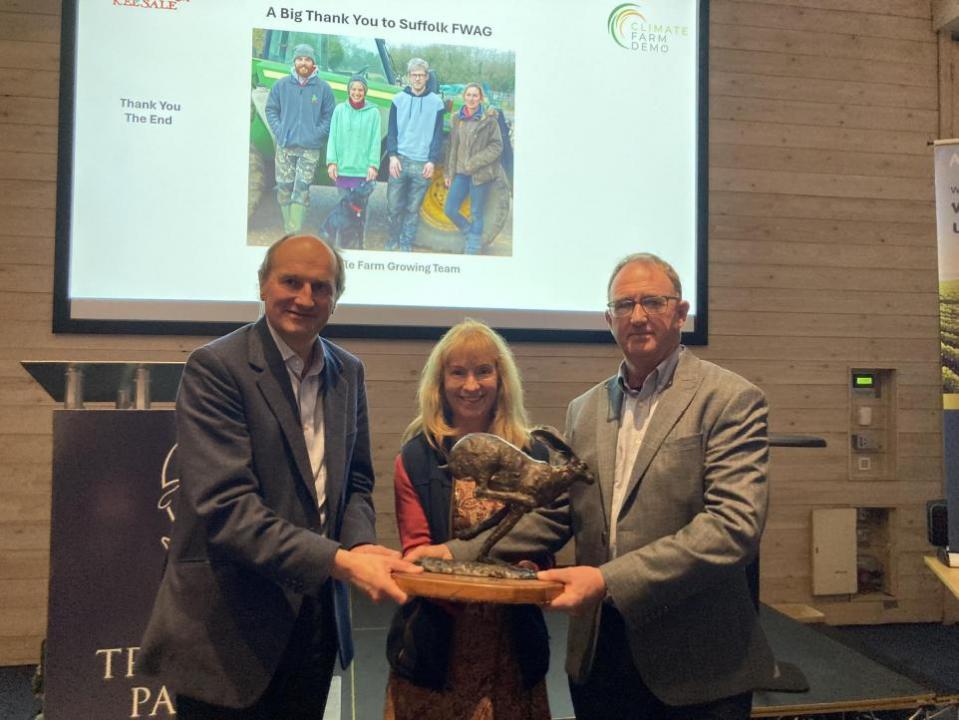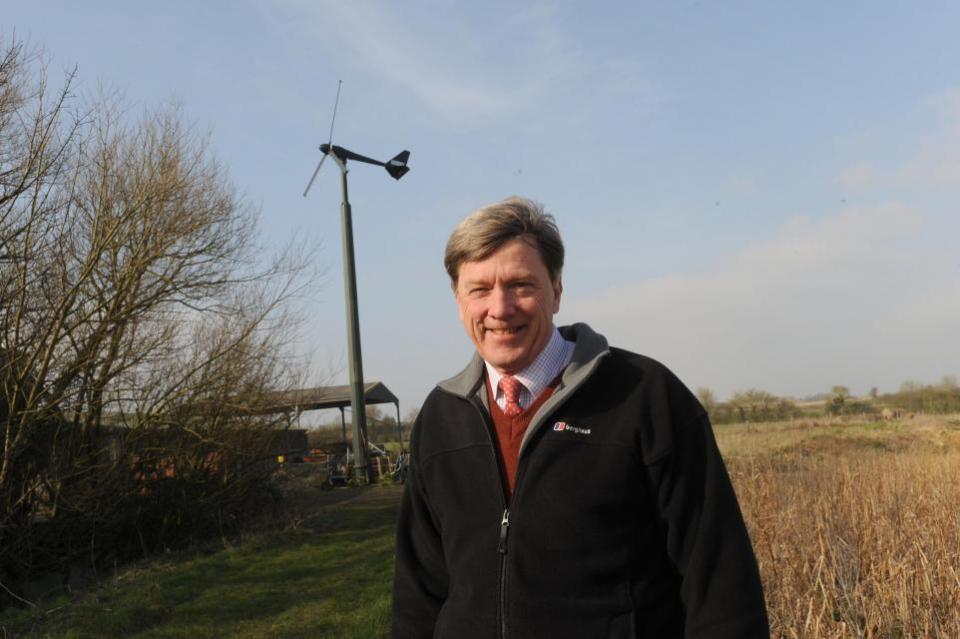Two contrasting farm businesses in Suffolk – both doing their part to produce food in a much more environmentally sustainable way – were celebrated at a moving awards ceremony on Monday (29 January).
An organic farm and an agricultural machinery manufacturer were both honored at the Suffolk Farming and Wildlife Advisory Group (FWAG) awards ceremony in Trinity Park, Ipswich.
The evening was a fitting tribute to that late chairman Chris Knock, who passed away in January.
He was very much looking forward to chairing the event when he was struck by a fatal illness just a few weeks earlier.
Former chairman Glenn Buckingham – who replaced him – described him as “a great guy”. “It’s very sad that we lost him,” he said.
Chief executive Anna Beames paid tribute to its “amazing chairman” who practiced what he preached on his own farm in Battisford, near Stowmarket.
Glenn and Anna suggested that Chris’ legacy lived on at the Suffolk FWAG, the awards ceremony – and through the trees that were coincidentally collected to plant on his farm on the day of his death.
“Tonight is all about nature-based solutions, natural capital and the ability to change agricultural approaches to combat global warming – and this is exactly where you will find Chris Knock,” said Anna.
The evening celebrated two “exceptional” farms, she said: Maple Farm – an organic farm in Kelsale, near Saxmundham – which won the Tim Sloane Award, and Claydon Drills in Wickhambrook, near Newmarket, which scooped the Peewit Award .

On hand to collect the coveted trophies were William Kendall, co-owner of Maple Farm, his farm manager Mike Mallett and Jeff Claydon – inventor of the Claydon Drill, which is designed to plant seeds without plowing the soil – and his sons Oliver and Spencer.


Chris Knock’s family did not attend the event, but did send a message to delegates thanking those who had supported them in their grief. They said he was “delighted and proud” to be appointed chairman of the Suffolk FWAG.


Trees had always been a part of his farm – a legacy passed down from his parents John and Pat Knock, the family added.
“Chris was a progressive thinker, an ideas person. He always looked for solutions together and brought people together,” the family said.
“He recognized and reflected on the challenges posed by both agriculture and the environment and was keen to find practical solutions that work for everyone, seeking win-win outcomes.
“He practiced regenerative agriculture on his own small farm, but also understood that there is no one solution for every farm and farmer.”
Award winner Mike Mallett explained how the 350-hectare Maple Farm combined organic chickens from 1,800 laying hens, agroforestry, a fruit and vegetable farm and the growing of traditional or “heritage” wheat – mainly for making high-quality bread.
“Customers wanted to bake bread and that was a bit customer-oriented,” he explained.
On a trip to Sweden he collected landrace grains and even more traditional varieties of long straw straw from a farm in Wiltshire.
In 2019, the farm conducted live seed trials and is simultaneously growing modern and historic varieties, he explains.
Two or three species attracted noticeably fewer weeds than others. He rejected the modern breeds that did not grow well for them in their organic system.
The seeds are sown in the fall and then run off, he said, leaving the fields to nesting birds “and whatever wants to be there.”
He has discovered that certain ‘weeds’ grow on the carpet around the crop. “I don’t want to call them weeds, I want to call them arable crops,” he said. “They don’t compete with the wheat at all.” He was “passionate” about the insects that flowering plants attract, he said.
He also “absolutely loved” bi-cropping – combining beans and wheat, peas and barley and clover with seeded grain.
He had an average wheat yield of around 3 tonnes/ha, with the best yield around 4.1 tonnes/ha – significantly lower than what non-organic conventional farmers could achieve.
He was not a fan of the current search for ‘super’ varieties. He liked vetch as a ground cover and sowed it in the fall. When the soil needed more nutrients, Benacre grazer Tim Crick brought in a flock of sheep, he said.
“For me, the future is about organic farming,” he said. “I think we’re going to see mixtures, just combine them.”
Jeff Claydon took delegates on a trip down memory lane as he recalled the 1970s and the time when Bury Market was a hive of interest and economic activity, as well as an important meeting place for farmers.
“There was a lot more cohesion and a lot more village life. Unfortunately, my village is now fast approaching dormitory,” he said. The market in its heyday was “better than eBay” in terms of deals made and bargains found.
He recalled stubble burning – a practice later banned – and the use of chemicals to control weed outbreaks and grow crops. In the late 1960s, yields of 2 tons/has were considered good, he recalled, but that changed dramatically with technical and chemical advances.
He first put his engineering skills to good use on the farm by designing a Yield O Meter that could measure yield as crops were harvested. That took off and it went into production.
In 1974 he sold the last pigs on what is now a 360 hectare arable farm. But when the farm turned its focus entirely to growing grain crops, he began to see problems.
Burning stubble killed worms – which he believed were essential to the health of the soil – and the soil he worked with became like concrete.
He searched for answers and eventually found them in his own Claydon low and no tillage seeders, made on the farm.
Today, the farm’s production employs more than 70 people and machine sales continue to increase.
The range includes Claydon Evolution and Hybrid seeders, straw harrows, TerraStar light cultivators and TerraBlade inter-row hoes – all designed and built in-house. This means you no longer have to plow the fields, saving you time and money.
The company has become the European market leader in direct seed technology and has seen demand for its products increase tenfold since 2010.
“It has changed the way people farm in 32 countries,” says Jeff. “It’s about reducing costs as much as possible, but maintaining revenue.”
He was “delighted” to receive the award “at a time when agriculture is under increasing environmental and economic pressure”, he said.
Anna described Jeff Claydon as “a deserved winner”.
“Soils are the agricultural sector’s greatest asset, but many of them have been so degraded that they are now merely a growing medium dependent on high levels of artificial inputs to maintain productivity.”
Jeff’s holistic approach to crop production, which delivers consistent, high-yielding crops at low costs for maximum profitability – and enabled farmers to become more environmentally sustainable, she said.
“During our visit to Claydon farm we could see the huge improvements this approach has achieved over the past 22 years, including high worm numbers and staggering amounts of organic matter in the soil.
“Worms may not be sexy, but they are the unsung heroes of the agricultural world and play an important role in changing soils for the better.”
The evening concluded with an online link to American biologists and geologists David Montgomery and Anne Biklé, co-authors of What your Food Ate, which aims to show how human health is linked to healthy soil.
They believe regenerative agricultural practices hold the key to healing diseased soils – and can help reverse the trend toward nutrition-related diseases.